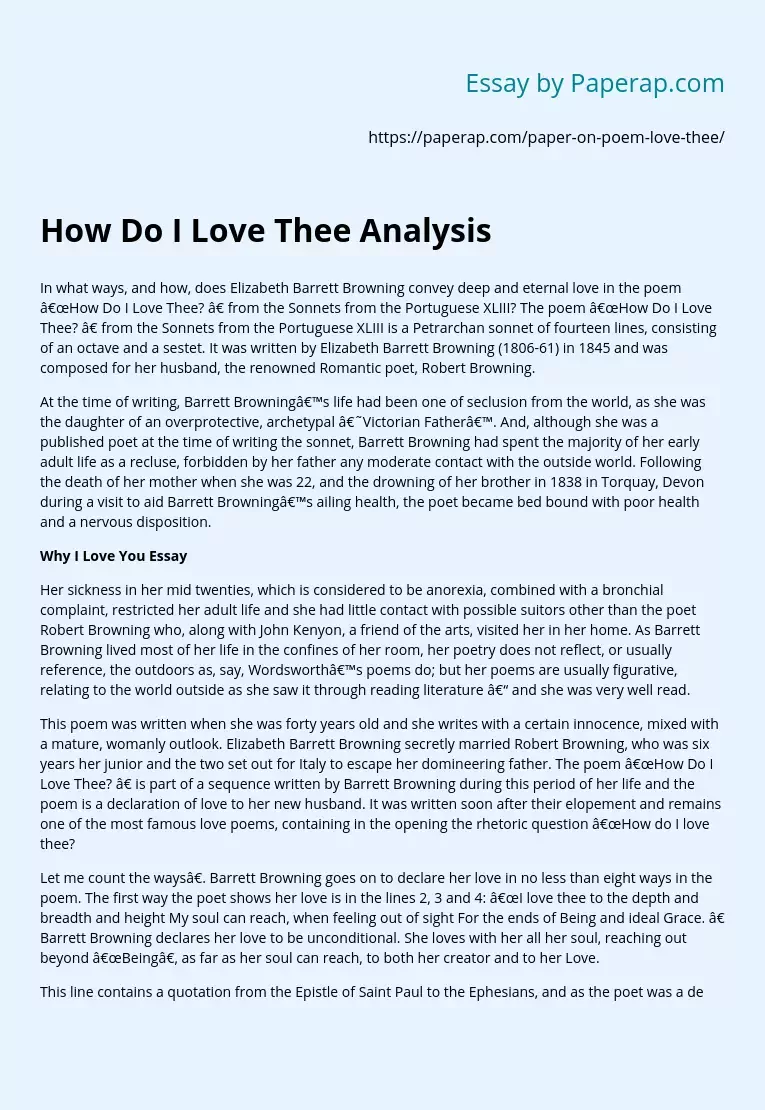How Do I Love Thee Analysis
In what ways, and how, does Elizabeth Barrett Browning convey deep and eternal love in the poem “How Do I Love Thee? ” from the Sonnets from the Portuguese XLIII? The poem “How Do I Love Thee? ” from the Sonnets from the Portuguese XLIII is a Petrarchan sonnet of fourteen lines, consisting of an octave and a sestet. It was written by Elizabeth Barrett Browning (1806-61) in 1845 and was composed for her husband, the renowned Romantic poet, Robert Browning.
At the time of writing, Barrett Browning’s life had been one of seclusion from the world, as she was the daughter of an overprotective, archetypal ‘Victorian Father’.
And, although she was a published poet at the time of writing the sonnet, Barrett Browning had spent the majority of her early adult life as a recluse, forbidden by her father any moderate contact with the outside world. Following the death of her mother when she was 22, and the drowning of her brother in 1838 in Torquay, Devon during a visit to aid Barrett Browning’s ailing health, the poet became bed bound with poor health and a nervous disposition.
Why I Love You Essay
Her sickness in her mid twenties, which is considered to be anorexia, combined with a bronchial complaint, restricted her adult life and she had little contact with possible suitors other than the poet Robert Browning who, along with John Kenyon, a friend of the arts, visited her in her home. As Barrett Browning lived most of her life in the confines of her room, her poetry does not reflect, or usually reference, the outdoors as, say, Wordsworth’s poems do; but her poems are usually figurative, relating to the world outside as she saw it through reading literature – and she was very well read.
This poem was written when she was forty years old and she writes with a certain innocence, mixed with a mature, womanly outlook. Elizabeth Barrett Browning secretly married Robert Browning, who was six years her junior and the two set out for Italy to escape her domineering father. The poem “How Do I Love Thee? ” is part of a sequence written by Barrett Browning during this period of her life and the poem is a declaration of love to her new husband. It was written soon after their elopement and remains one of the most famous love poems, containing in the opening the rhetoric question “How do I love thee?
Let me count the ways”. Barrett Browning goes on to declare her love in no less than eight ways in the poem. The first way the poet shows her love is in the lines 2, 3 and 4: “I love thee to the depth and breadth and height My soul can reach, when feeling out of sight For the ends of Being and ideal Grace. ” Barrett Browning declares her love to be unconditional. She loves with her all her soul, reaching out beyond “Being”, as far as her soul can reach, to both her creator and to her Love.
This line contains a quotation from the Epistle of Saint Paul to the Ephesians, and as the poet was a devout reader of the bible, the reference reflects her knowledge and understanding of the scriptures. The length, breadth and height she mentions conveys the shape of a crucifix: as high as God’s love, as deep as Christ’s love and sacrifice and as long lasting as infinity. Her love, she is saying, is as deep, broad and long as her soul can reach and is as great as the length, breadth and height of God’s love. Her love is as unconditional as, and is part of, the love Christ has for man.
The reference to “Being” and “Grace” in line 3 relate to the ‘Great Chain of Being’ which links God with man via the angels right down to the animals, plants and the Earth itself. “Grace” is the ‘link’ within the chain, connecting God with all of his creation. As God’s love is infinite, Barrett Browning is declaring her love as the same, unconditionally reaching out to the length, breadth and height of Being and Grace. Her love reaches beyond her life, beyond Being and Grace, to the end of her life – to her salvation.
How Do I Love Thee Analysis. (2019, Dec 05). Retrieved from https://paperap.com/paper-on-poem-love-thee/

